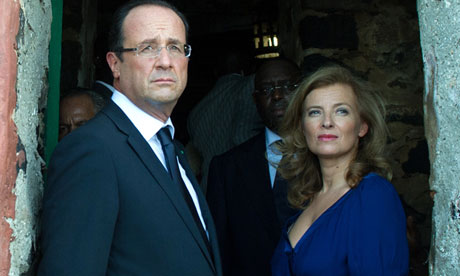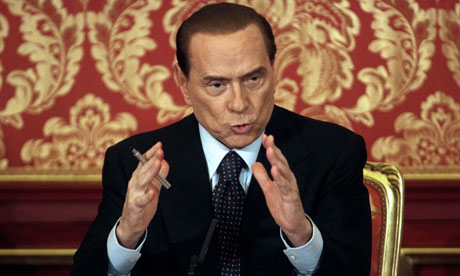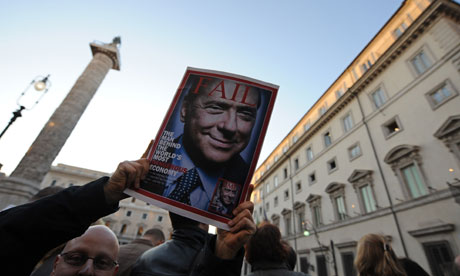http://www.guardian.co.uk/world/2012/oct/28/french-left-crisis-economic-gloom

http://www.guardian.co.uk/world/2012/oct/28/berlusconi-election-manifesto-convicted-angry

http://ex-skf.blogspot.com/2012/10/italians-take-to-street-to-protest.html
Organizers say 100,000. Reuters say "tens of thousands", which is one order of magnitude bigger than the customary "thousands" when the media reports any protest anywhere in the world.
Despite a minor recent setback of having been sentenced to 4 years in prison for tax fraud (and not likely to ever be in jail anyway), Silvio Berlusconi vows to take down the unelected prime minister who was installed by the EU troica of IMF, the EU and the ECB.
(Berlusconi's center-right party is part of the Italian coalition that props up the Monti administration, as Reuters reports in a separate article.)
From Reuters (10/27/2012):

Francois Hollande holds crisis talks after 'worst week' for bruised party
Factory closures and spending deficit have fuelled voters' doubts over ability of president to lead country to recovery

President Francois Hollande with his partner Valerie Trierweiler. Public has lost confidence in his promises to tackle economic crisis. Photograph: Bertrand Langlois/AFP/Getty Images
President François Hollande will meet the heads of global economic organisations for crisis talks on Monday after suffering a series of damaging economic blows in what was his worst week since taking power five months ago.
The French leader has been hit by soaring unemployment figures, further factory closures and job losses, and plummeting popularity on top of growing fears that he and his Socialist government are failing to address the country's problems. Members of the opposition right-of-centre UMP have accused them of being "amateurs".
The meeting with chiefs of international organisations, including the International Monetary Fund, the World Bank, the Organisation for Economic Co-operation and Development and World Trade Organisation, has been billed by the Elsyée as a "sharing of views".
However, sources told the Observer the economists will urge Hollande to press on with key structural reforms to improve France's competitiveness on the world market and restore confidence at home and abroad. World financial institutions are said to be encouraged by Hollande's efforts to reduce France's large public spending deficit, but are seeking more from the French leader.
Hervé Boulhol, a senior OECD economist, said France needed "deep structural reforms" to improve public and global confidence in the country. "Then people will believe there is a clear political direction towards tackling unemployment, public spending and competitiveness. It is these three things that need to be addressed," he said.
"At the moment, France is just above average in Europe, but if we are to avoid the extreme situations other countries have found themselves in, one has to find a way out of this crisis. There's no room for complacency."
As the French head off for an autumn break after weeks of increasingly gloomy news, commentators have warned of growing anguish and despair among voters and deep disillusionment with the country's Socialist government.
"People knew there would have to be, as Churchill said, blood, sweat and tears and this was never going to be popular," Jérôme Fourquet from the opinion pollster Ifop, which carries out regular surveys of the public mood in France, said: "They knew there would be tax rises and reforms, whoever was elected, and they were prepared to make the effort, even if painful, if it was worth it. But with the situation seemingly getting worse, people don't see a light at the end of the tunnel and Hollande is not providing one. This has made people pessimistic, anxious and fearful."
The French, pollsters admit, have a tendency to be "morose", but the metaphor of an economically battered France as a ship in a storm taking on water, while passengers look desperately to the captain to save them, is often heard these days, along with concern that Hollande and his Socialist crew are not sufficiently experienced to handle the crisis.
In such a climate, the slightest faux pas has created a full-blown tempest. Last week prime minister Jean-Marc Ayrault suffered what was dubbed Black Wednesday after announcing the French Constitutional Court was to scupper a housing bill before the council had even sat down to decide. The government was bashed again for appearing to lobby against a report it had itself commissioned, on how to improve France's economic competitiveness and plug a trade deficit that reached a record €70bn (£56bn) in 2011, after its author suggested a "massive" cut in business taxes.
News that unemployment, having broken the 3 million barrier in August, had leaped by 46,900 in September, the highest monthly increase since 2009, plus more factory closures and layoffs, made the general gloom even murkier.
Carine Marcé of pollster TNS-Sofres, whose recent survey discovered that 70% of French people thought things could only get worse, said the daily bad news had created a vicious cycle.
"Every day there is the announcement of more job losses and people worry even when it doesn't affect them, because they think they're next. And when people are worried, they consume less and it becomes the snake biting its own tail." She added: "The French have been morose for 30 years; François Hollande fed them hope of things improving but the French had no great expectations. They knew their country had been hit by crisis and there was no magic solution.
"People are not convinced by the government, not convinced they are good enough. They used to say, 'France is not Greece or Spain', but now they are beginning to worry it is heading that way."
Fourquet agreed that the popularity of the president and PM had suffered a "brutal and spectacular fall", but said the causes were mostly out of their control. "The factors behind this are unemployment, redundancies, factory closures, the drop in spending power, the rising price of energy and petrol. All this weighs heavily on the morale of the French, but it's not just a problem in France."
Laurence Sauvage, national secretary of the leftwing Parti de Gauche, describes the atmosphere in France as "toxic" and warned it was conducive to driving voters into the arms of the extreme-right Front National.
"The Left has incredible, historic power in France... but the government is not rising to the occasion," she said. "It is sad to see how afraid and unhappy people are."
She added: "François Hollande promised the time for change was now. But there's no change, just disillusion. If this continues, people will be beating a path to Marine Le Pen."
and Italy protests Monti even as an enraged Silvio gets a jail sentence he will never serve but seems to declare war ........
Silvio Berlusconi pitches Italian politics into fresh confusion
Despite his conviction for tax dodging the former prime minster delivers what looks like a manifesto for a snap election

Italy's former prime minister, Silvio Berlusconi, at his press conference in Gerno di Lesmo, Monza, on Saturday. Photograph: Stefano Porta/EPA
Italian politics has been thrown into a state of renewed uncertainty after Silvio Berlusconi – enraged by his conviction for tax dodging – warned that he was considering bringing down Mario Monti's government and pitching the country into a snap election.
Earlier, he had announced that he would remain in politics "to reform the world of justice".
Speaking at a press conference on Saturday, a visibly irate Berlusconi lashed out at a "judge-ocracy", which he said was running Italy. In a 55-minute monologue, he also turned his rage on Angela Merkel (who, together with the former French president Nicolas Sarkozy, he portrayed as the architect of his removal from office last year) and Monti, whom he depicted as her poodle.
Slipping into the royal "we", the former prime minister declared: "In the next few days, we shall decide with the senior members of my party whether to withdraw confidence from the government or, given the closeness of the end of the legislature, leave it to work out its mandate."
His threat was delivered on the eve of a crucial regional vote in Sicily – the first big test of public opinion in the approach to the general election, which must be held by next spring.
The former prime minister confirmed last week he would not be standing for re-election. But his family's newspaper, Il Giornale, reported on Sunday that – out of range of the microphones – Berlusconi had said the election could be held in January and, that being the case, there would be no time to choose his replacement.
He used the press conference – packed with supporters who periodically broke into applause – to set out what looked very much like an electoral manifesto. His main points included the abolition of a limit on cash payments introduced by the Monti government to curb tax evasion, and the abolition of an unpopular property tax that was re-imposed as part of a drive to eliminate Italy's budget deficit.
On paper, Berlusconi's party, the Freedom People (PdL), could strip Monti and his technocrats of their majority in the upper house of parliament. But it remains to be seen how many of the PdL's lawmakers would follow the party founder's orders.
The PdL has been haemorrhaging support for months now, despite an earlier suggestion from Berlusconi that he would stand again. On Sicily, it faces a stiff challenge from a centre-left alliance and the Five Star Movement, led by the comedian and blogger Beppe Grillo.
Il Giornale reported that the PdL's senior officials, who had not been told in advance of what Berlusconi planned to say, were "in shock". Some were furious, it said.
SATURDAY, OCTOBER 27, 2012
Italians Take to Street to Protest Against Technocrat (and Goldman Alum) Prime Minister Monti
Organizers say 100,000. Reuters say "tens of thousands", which is one order of magnitude bigger than the customary "thousands" when the media reports any protest anywhere in the world.
Despite a minor recent setback of having been sentenced to 4 years in prison for tax fraud (and not likely to ever be in jail anyway), Silvio Berlusconi vows to take down the unelected prime minister who was installed by the EU troica of IMF, the EU and the ECB.
(Berlusconi's center-right party is part of the Italian coalition that props up the Monti administration, as Reuters reports in a separate article.)
From Reuters (10/27/2012):
Tens of thousands protest against austerity in Rome
(Reuters) - Tens of thousands of people marched through Rome in a "No Monti Day" on Saturday, some throwing eggs and spraying graffiti to protest against austerity measures introduced by Italian Prime Minister Mario Monti's government.
Appointed in November when Italy risked being sucked into the euro zone debt crisis, Monti has pushed through painful tax hikes, spending cuts and a pension overhaul.
"We are here against Monti and his politics, the same politics as all over Europe, that brought Greece to its knees and that is destroying half of Europe, public schools, health care," said demonstrator Giorgio Cremaschi.
Some protesters threw eggs at bank windows and set off firecrackers, but no major incidents were reported."United with a Europe that is rebelling. Let's get rid of the Monti government," read one of the banners held at the demonstration.
Unemployment in Italy has risen to 10.7 percent, its highest since monthly records began in 2004, and unions are locked in disputes with companies over plant closures and layoffs. The nation's public debt is running at 126 percent of output, according to the International Monetary Fund.
"It's been years that there have been no investments, instead it's all outsourced and privatized, we are here to say enough and we hope this voice will grow," said another demonstrator, Caterina Fida.
Organizers said more than 100,000 people participated in the demonstration.
Monti says he believes his technocratic government will be remembered for having helped Italy pull itself out of a deep economic crisis without needing to resort to external aid.
Separately, some 20,000 doctors and nurses, wearing their white hospital gowns or uniforms, marked in another section of Rome to protest cuts to the national health service.
"The entire system risks collapse if the cuts continue," one demonstrator said on television.
In another demonstration in northern Italy, a small group of protesters scuffled with police near where Monti was addressing a rally on the theme of family values.
Family values? What could that be? That family members should support each other without the money from the government? (Which is by the way the Japanese way that even the Japanese do not and cannot practice these days.)
http://www.guardian.co.uk/commentisfree/2012/oct/26/silvio-berlusconi-jail-sentence-matters
Why Silvio Berlusconi's jail sentence matters, even though he won't serve it
Regional elections will test whether Italians have lost patience with the sleaze and corruption of Berlusconi and his party

Italians celebrate after Silvio Berlusconi was forced to resign in 2011. Photograph: Gabriel Bouys/AFP/Getty Images
There is rich irony in what has happened in Italy this week.
Ever since Silvio Berlusconi decided to enter politics 19 long years ago, he and his supporters have clung to the argument that his legal problems were a result of that decision. Investigations into his financial affairs and private life, they insisted, were the work of leftwing prosecutors, who were trying to achieve in the courts a victory that leftwing parties were unable to achieve at the polls. It followed logically that, as soon as he retired from politics, the politically motivated jurists who were bent on putting him in jail would lose interest and turn the spotlight of their investigations on the media tycoon's successor as leader of the right.
His supporters would often say so: "Just you wait – the day he steps aside, his legal problems will just melt away."
On Wednesday, after months of dithering, Berlusconi announced that he was standing down, definitively and irrevocably, as his party's candidate for prime minister in the election that has to be held in Italy by the end of next April. Today, two days later, a court in Milan sentenced him to four years in jail.
So much for that theory.
Berlusconi will not, of course, go to jail. The Italian legal system is far too lenient for that. Or, to be more precise, it is a lot better at putting people in jail before they are tried than after.
It soon emerged that three years were being knocked off Berlusconi's four-year sentence because of an amnesty introduced by the (centre-left) government in 2006. As for the remaining one year, well, Berlusconi gets two appeals and, since the courts move so slowly in Italy, he can assume that, before his appeals have been heard, a statute of limitations will have kicked in, timing out the charges against him.
So does what happened in Milan today actually matter? It does. But politically more than judicially.
Berlusconi regards as the crowning triumph of his political career the unification of the Italian right. Three years ago, he founded the Freedom People – a merger between his own Forza Italia! party and the rump of Italy's neo-fascist movement. Known by its Italian initials as the PdL, the Freedom People movement is not a monolithic conservative party comparable with the Tory party in Britain or the Partido Popular in Spain. The Northern League stayed out. So did the main conservative Christian Democrat party. But it was nevertheless a considerable achievement.
Today, the PdL is in stark disarray. Recent polls have suggested it now has less support than the Five Star Movement created by the comedian and blogger, Beppe Grillo. On average, in the five nationwide surveys conducted before 21 October, the PdL obtained less than 17% of the vote, compared with more than 27% for the centre-left Democratic party.
Robbed of Berlusconi's charismatic leadership (you can't deny the man knew how to grab the headlines) and lacking any cohesive ideology, the PdL had been floundering for months. But what really sent it into a tailspin was the cumulative effect of a string of corruption scandals in regional administrations dominated by the PdL. The governors of Lazio, the region around Rome, and of Lombardy, the region around Milan, have both stood down as a result.
In normal times, Italians are pretty fatalistic about the sleaze that oozes out of their institutions. But these are not normal times. After more than a decade of virtually no economic growth, rounded off by the crisis in the eurozone, they are beginning to feel real financial pain. And they are not at all amused to read of lawmakers with eight houses and governors taking Caribbean holidaymakers paid for by their businessmen chums, let alone regional ministers in thrall to organised criminals.
On Sunday, the PdL faces a crucial test when regional elections are held on Sicily. It will be the first real test of public opinion in the approach to the general election. The very last thing the PdL needed was for its founder – and the man who was Italy's prime minister for most of the years in which its economy languished – to be convicted two days before of dodging the taxes that most ordinary voters have no option but to pay.
and more protest of austerity pain in Spain.....
http://www.aljazeera.com/news/europe/2012/10/20121027185635884352.html
| Spain police thwart mass march to parliament | |
Thousands of anti-austerity protesters held back from surrounding Madrid's legislature to denounce government cutbacks.
Last Modified: 27 Oct 2012 20:12
| |

Earlier in the day, thousands of off-duty police officers held their own anti-austerity protest [EPA]
| |
| Several thousand people have marched to Spain's parliament in an anti-austerity protest, but were held back from surrounding the building by metal rail barricades and a large police presence.
The "Surround Parliament" protest group had on Saturday called on people to gather at Plaza de Espana and march on the legislature to express their opposition to spending cuts and tax hikes introduced by Prime Minister Mariano Rajoy's government.
Police on horseback and with dogs had earlier arrived at Neptuno fountain next to parliament in preparation for crowd control duties as the protesters marched 2.3km from the gathering point. Protesters were accompanied along the route of the march by a strong police escort, including vans with reinforced windows. Demonstration organizers said protesters will be asked to hold a minute of silence with their backs turned on parliament to express their disapproval of government public sector cuts while offering financial support to ailing banks. "And now they are going to give banks a bailout, rescue them as if they were princesses," said Alan Pipo, 70. "They should be put out on the streets, just like all those families who are being evicted from their homes because they are unable to keep up with mortgage payments." Rampant unemployment Earlier, about 3,000 off-duty police officers had also demonstrated to protest the government's austerity measures, including the cancellation of their Christmas bonuses. The police protest blocked one of the capital's central boulevards opposite the interior ministry. On-duty police officers watched as their off-duty colleagues demonstrated by throwing fireworks and chanting slogans. A demonstrator was injured when a firework he was set to throw exploded in his hand. Many protesters draped themselves in Spanish flags and added to the ear-splitting noise by blowing their police-issued whistles. Since being voted to office in general elections in November, Rajoy has hiked taxes, cut spending, including a wage-cut for civil servants, and introduced stinging labor reforms in a bid to persuade investors and international authorities that he can manage Spain's finances without the need for a full-blown bailout. However, Spain's public finances have been overwhelmed by the cost of rescuing some of its banks and regional governments, many of which have experienced heavy losses following a property sector crash in 2008. One Spaniard in four is unemployed as the economic crisis tightens its grip. The government is under pressure to seek aid to ease debts while the country sinks into its second recession in three years.
|





No comments:
Post a Comment